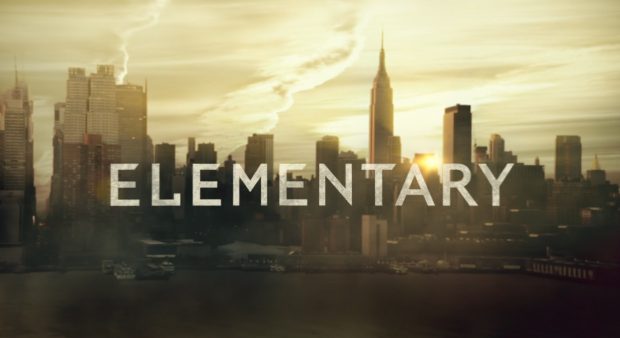Missing Sherlock? The solution is Elementary…
Feeling a Holmes-shaped gap in your heart that re-watching a mere nine episodes just can’t fill? Not looking forward to another year (or two) long gap between series? It’s sad but true that BBC’s Sherlock has closed up shop until at least next Christmas, but do not resign yourself to twelve months worth of shooting holes in the wall and weeping over your DVD box set just yet; try out CBS’ Elementary first.
The two series are both contemporary re-imaginings of the same source material, Arthur Conan Doyle’s Sherlock Holmes stories, and were released within a few years of each other. Comparisons are inevitable, as is competition between the two show’s respective fanbases and even their cast and production team. Back when Elementary was first announced, Sherlock’s producer Sue Vertue tweeted “Mmm interesting CBS, I’m surprised no one has thought of making a modern day version of Sherlock before, oh hang on, we have!”
But I think rivalry between the two shows is unnecessary. There have been countless Sherlock adaptations over the years that don’t have any conflict with their various counterparts; you don’t feel as if you’re cheating on Sherlock when you devote a few hours to watching the 2009 Sherlock Holmes, with Robert Downey Jr. and Jude Law, or Grenada’s the Adventures of Sherlock Holmes, the granddaddy of screen adaptations.
do not resign yourself to twelve months worth of shooting holes in the wall; try out CBS’ Elementary
So, without further ado, let me explain to you why even the diehard Sherlock fan could love Elementary; and at the other end of the spectrum, why someone who didn’t like Sherlock shouldn’t swear off the detective just yet.
The first string to Elementary’s violin bow is its cast. Johnny Lee Miller makes a fantastic Holmes, consistently delivering his often complex and poetic dialogue perfectly, and presenting a character that is not only a genius, but engaging on a human level. This Holmes is markedly flawed in a number of ways, but chief among them is his past drug addiction, the premise for his exile from Scotland Yard, and England, and subsequent setting up in New York as a consultant for the NYPD. The series sees Holmes battle with his past ghosts in more than one way, a plot-thread neatly woven into the series without sacrificing any of the crime and detective procedural nature of the programme.
The success of Miller’s Holmes is in no small part due to the on-screen chemistry between Miller and his co-star Lucy Liu, who plays a (gasp!) female adaptation of John Watson, Joan. A lot of people have found the idea of a female Watson deterring: don’t. Liu’s Watson is clever and capable, far more than usually seen in this role. Her history likewise surfaces frequently, giving her character depth and adding dimensions to the Watson-Holmes relationship not usually seen, when the focus is more fixated on the title character.
The supporting cast of Elementary cannot be neglected, as superb as it is. The show sees a diverse range of characters interacting with the duo on their investigations, from familiar faces from the novels such as Captain Gregson (Aidan Quinn) rubbing shoulders with entirely new characters, like my personal favourite Detective Marcus Bell (Jon Michael Hill).
These characters have the time to become explored by the series because, in true accordance with American television, Elementary has gone big, producing 24 episodes each around 45 minutes long for its first season alone. Now in the middle of its second season of the same length, with the show being picked up for a third season not unlikely, the advantages of having this sort of time to play with are obvious. We see both the lead roles undergo significant character development, without it feeling rushed or inconsequential to the main plot.
And therein is the final, and in my opinion greatest, reason to watch Elementary, its exceptionally wonderful plot. The first series sees the show build up both Holmes’ relationship with Irene Adler, which is dealt with beautifully and is by far my favourite take on the original novel A Scandal in Bohemia, and the criminal mastermind Moriarty. I can’t talk much about this without spoiling the show’s chief credential, but know that the run up to the first series finale was absolutely devastating. Nobody can touch Andrew Scott’s Moriarty, from BBC’s Sherlock, for sheer chilling insanity and copious fear factor, but I found Elementary’s reinterpretation of events more original, and consequentially more compelling.
Elementary‘s only weakness is that it can sometimes slip a little into the repetitive murder-of-the-week style structure, the name of crime procedurals everywhere. But most of the time this isn’t a problem; each investigation and all the deductions are different enough that the show doesn’t become predictable. the show is filled with enough interesting devices that it doesn’t show; an obvious example is in Sherlock’s deductions. The fact that Homes talks the audience, via Joan and often members of the NYPD, through the stages of his ‘observation’ is something I particularly enjoy, as it makes the proceedings feel more realistic, as well as more engaging.
So that’s the show; come for the name of the great detective and Dr Watson, stay for the superb characters and story line. It’s Elementary, my dear readers.

Comments